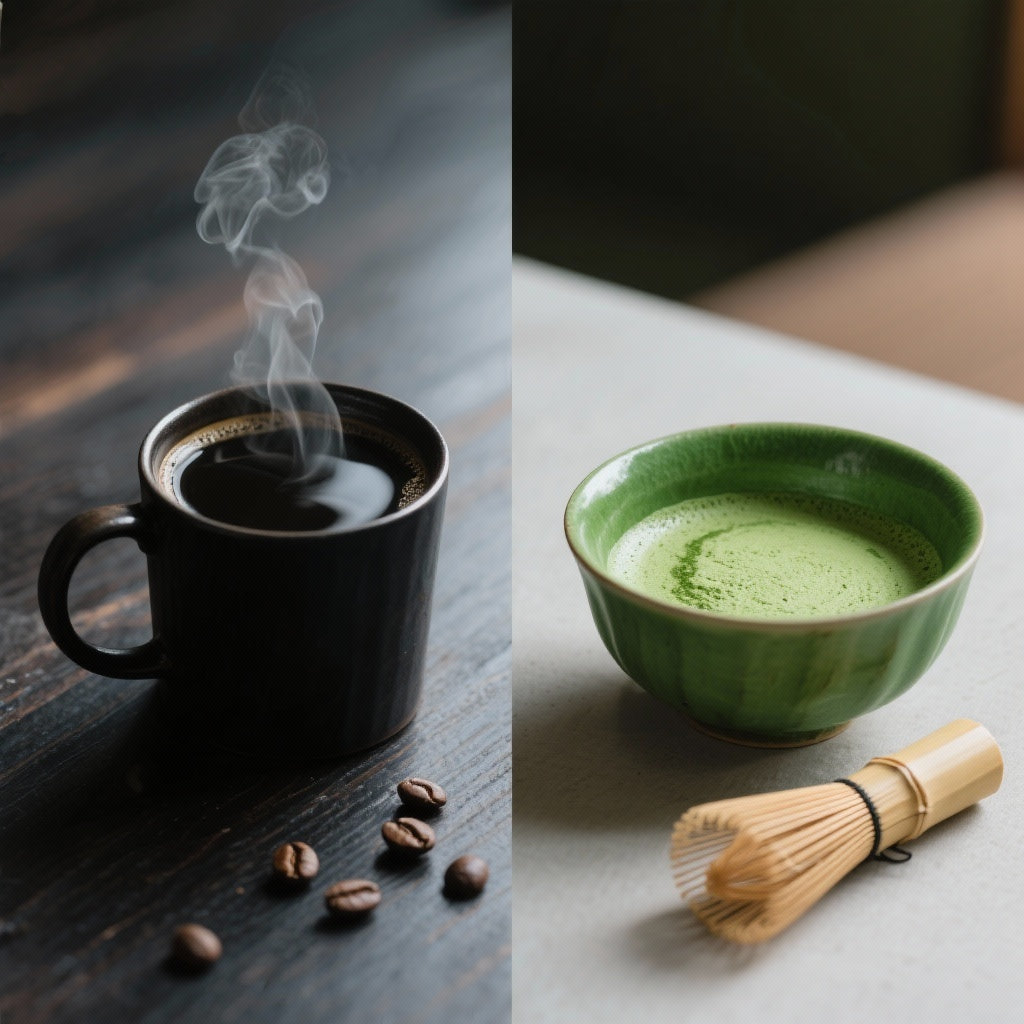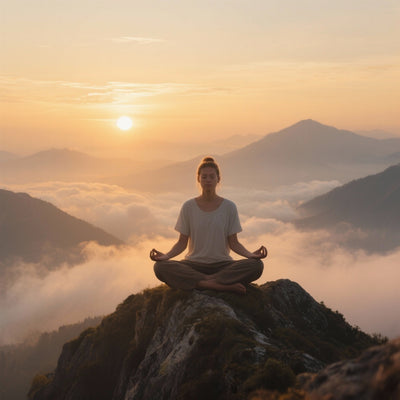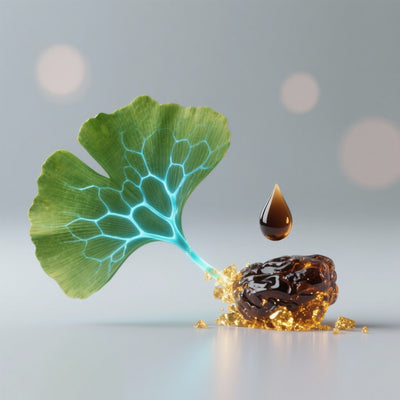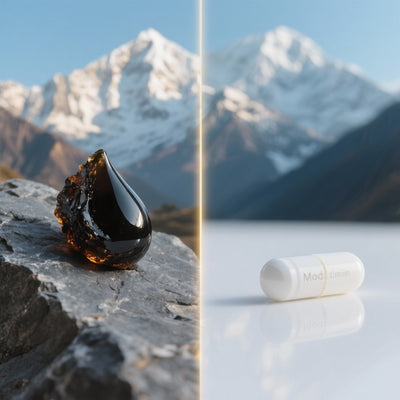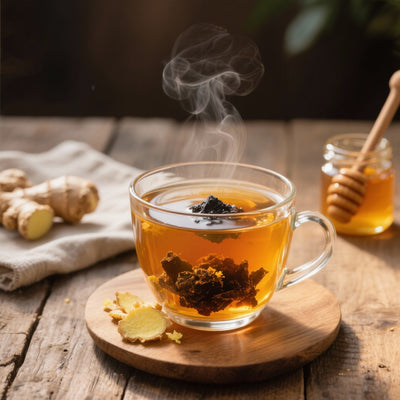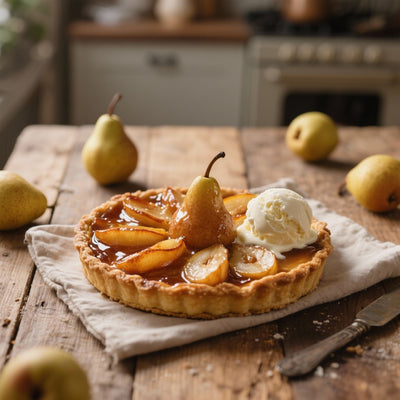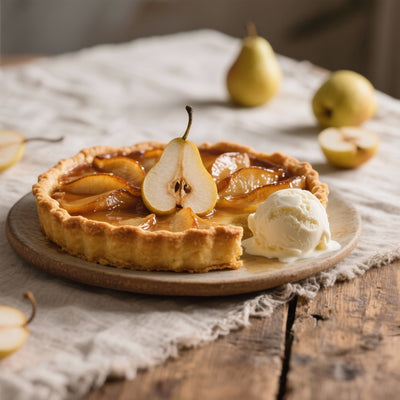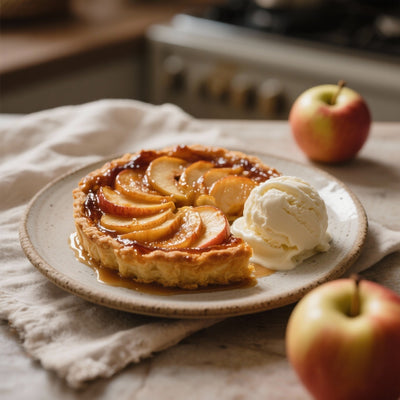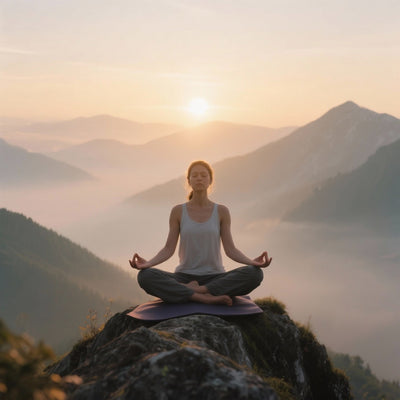Coffee vs. Matcha Tea: Which to choose for sustainable energy?
Every morning, millions of people face the same dilemma: how to get that essential boost to tackle the day? In the left corner, the undisputed champion, the powerful aroma of coffee. In the right corner, the sophisticated challenger, the emerald green powder of matcha tea. This showdown goes far beyond taste. It's about choosing an energy source that not only wakes you up but also sustains you throughout the day, without the dreaded afternoon slump. If you're looking to optimize your focus, mood, and overall well-being, this guide is for you. We'll break down the science, benefits, and rituals behind these two beverages to help you make the most informed choice for your body and mind.
A journey through time: To the origins of grain and leaf
Before comparing their effects, it's fascinating to understand the origins of these two pillars of world culture. Coffee, with its roasted beans, comes to us from the highlands of Ethiopia. Legend tells the story of goats that became surprisingly energetic after eating the berries of a coffee tree. From there, it conquered the Arab world, then Europe in the 17th century, becoming a symbol of productivity, intellectual exchange, and busy mornings.
Matcha tea, on the other hand, embodies tradition and mindfulness. Originating in China during the Tang Dynasty, it was perfected in Japan, where it became the heart of the tea ceremony, "Cha no yu." Unlike other teas, matcha is made from shade-grown green tea leaves, which are then ground into a fine powder. The entire leaf is consumed, not just an infusion. This fundamental difference is the key to its unique properties.
The mechanism of caffeine: Sudden shock vs. harmonious diffusion
Caffeine is the star ingredient common to both drinks, but its effect on our bodies is radically different. This is where the most important difference lies.
The Coffee Energy Peak
When you drink coffee, the caffeine is quickly absorbed into your bloodstream. It reaches its peak in 30 to 60 minutes, blocking adenosine, a neurotransmitter that signals fatigue to your brain. The result? Increased alertness, almost instant energy, and a feeling of power. It's the perfect ally for a powerful start to the day.
"Coffee gives you a quick and intense jolt. It's explosive energy, ideal for an immediate task, but often followed by an equally rapid crash."
However, this peak is often followed by a comedown, the infamous "crash." Your body metabolizes the caffeine, the effect wears off, and adenosine surges back, causing fatigue, irritability, and a strong urge... for another coffee. It's a sawtooth energy cycle.
The calm and lasting energy of Matcha
Matcha also contains caffeine, often in comparable or slightly less than coffee. So, where does the difference lie? It lies in a near-miraculous amino acid: L-theanine .
L-theanine has the unique ability to cross the blood-brain barrier and promote alpha waves in the brain. These waves are associated with a state of "calm alertness," a state of simultaneous relaxation and concentration. Think of the flow state experienced by artists or athletes.
Here's how this duo works:
- Slow absorption: L-theanine binds to caffeine, slowing its absorption by the body. Energy is therefore released gradually over a period of 4 to 6 hours.
- No spike, no crash: This prolonged release avoids the abrupt spike and subsequent drop. The energy is stable, constant, and sustained.
- Cognitive synergy: The combination of caffeine (alertness) and L-theanine (calm) creates an optimal brain environment for concentration, memory and creativity, without the nervousness or anxiety sometimes associated with coffee.
Health benefits: The battle of antioxidants
Beyond energy, coffee and matcha are both concentrated sources of health benefits, but their profiles differ.
The treasures of the coffee bean
Coffee is one of the richest sources of antioxidants in the Western diet. It is rich in hydrocinnamic acid and polyphenols, which help combat oxidative stress. Studies have linked moderate coffee consumption to a reduced risk of certain diseases, such as type 2 diabetes, Parkinson's disease, and some liver conditions.
Matcha's superpower: EGCG
Matcha is in a league of its own. Because the entire leaf is consumed, its antioxidant potential is multiplied. According to the ORAC (Oxygen Radical Absorbance Capacity) test, matcha contains up to 137 times more antioxidants than regular brewed green tea and far more than coffee.
Its secret weapon is a catechin called epigallocatechin gallate (EGCG) , an extremely potent polyphenol known for its anti-inflammatory properties and potential role in cell protection. EGCG is also being studied for its beneficial effects on metabolism and heart health.
So, how do you choose? A practical guide tailored to your needs.
The ideal choice depends entirely on your body, your lifestyle, and your goals. It's not about demonizing one to praise another, but about understanding which tool to use at the right time.
Choose the Café if...
- You need an immediate wake-up call and an energy boost for a morning workout or an important meeting.
- You like robust, bitter, and roasted flavors .
- Your body tolerates it well, without nervousness, anxiety or sleep disturbances.
- You are looking for a quick and affordable option (espresso machine, filter coffee maker).
Choose Matcha Tea if...
- You are looking for stable and prolonged energy for long work or study sessions.
- You are sensitive to the effects of caffeine and wish to avoid nervousness and anxiety.
- You want to improve your concentration and mental clarity in a calm state.
- You enjoy soothing rituals and taking a few minutes to prepare your drink.
- You are looking to maximize your intake of antioxidants , particularly EGCG.
Incorporating these rituals into a wellness routine is a great way to get the most out of them. For more ideas, feel free to check out our lifestyle blog .
Frequently Asked Questions (FAQ)
- 1. Can matcha help me sleep better than coffee?
- Yes. Although it contains caffeine, the presence of L-theanine promotes relaxation. Consumed early in the day, matcha disrupts the sleep cycle less than coffee, whose caffeine can remain active in the body longer and affect the quality of deep sleep.
- 2. Can I completely replace my coffee with matcha?
- Absolutely. The transition may take a few days to adjust if you're a heavy coffee drinker. Start by replacing one of your daily coffees with matcha, then adjust as you feel. You might be surprised by how consistent your newfound energy is.
- 3. What does matcha taste like?
- A good quality matcha (ceremonial grade) has a complex, smooth, slightly vegetal taste and a rich flavor called "umami." It is much less bitter than a lower quality green tea. If you enjoy lattes, a matcha latte is a great introduction. Discover delicious ideas on our recipe blog .
- 4. Is matcha more expensive than coffee?
- Per serving, a high-quality matcha can be more expensive than a standard filter coffee. However, when compared to specialty coffee purchased from a coffee shop, the price is often similar. It's an investment in better quality energy and superior health benefits.
